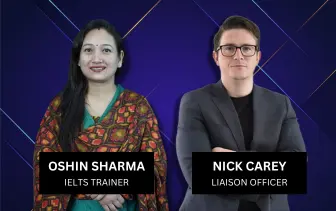
Meridean Overseas
Updated On 16 November 2022 & Read Time 6 minutes
3.4k
Nowadays, many students dream of studying abroad. They wish to gain highly competitive skills and knowledge from the top universities required to work in today's world. Apart from the quality education, students also get an opportunity to explore diverse cultures while studying abroad. Some top study-abroad countries include the UK, USA, Canada, Europe, Australia, and New Zealand. Most foreign universities assess the English proficiency skills of international students before enrolling them. One of the most accepted English proficiency exams is IELTS.
Table of Contents
IELTS (International English Language Testing System) is an English proficiency test recognised by almost all universities abroad. The IELTS exam is of two types, Academic IELTS and General IELTS. To secure admission to foreign universities, students must appear for the Academic IELTS exam. The test is divided into four modules, i.e., speaking, writing, listening, and reading. Each module helps to determine an individual's English language skills. The score of IELTS is valid for 2 years.
The exam is useful for admission to undergraduate, postgraduate, and PhD level courses. The registration fee for IELTS in pounds is GBP 160. There is no age limitation for appearing for the IELTS exam. Any person from any country can give the exam. However, it is advised to appear for an exam after the age of 16 years. The students can either opt for the computer-based test or the pen-paper test.
The maximum band that one can score in IELTS is 9. Whereas the minimum band score is 0. The overall band score is an average of scores of individual modules. The result of computer-based tests comes within a week, and the pen-paper test result takes about 2 weeks. Moreover, if the students are unsatisfied with their band score, they can apply for rechecking. The table below provides an overview of IELTS scores, skill level, and their description.
|
IELTS Score |
Skill Level |
Description |
|
9 |
Expert user |
The test taker has full command of the English language. Their use of English is appropriate, accurate and fluent, and shows complete understanding. |
|
8 |
Very good user |
The student has a fully operational command of the language with only occasional unsystematic inaccuracies and inappropriate usage. They may misunderstand some things in unfamiliar situations. They handle complex and detailed argumentation well. |
|
7 |
Good user |
The student has operational command of the language, though with occasional inaccuracies, inappropriate usage and misunderstandings in some situations. They generally handle complex language well and understand detailed reasoning. |
|
6 |
Competent user |
The student has an effective command of the language despite some inaccuracies, inappropriate usage and misunderstandings. They can use and understand fairly complex language, particularly in familiar situations. |
|
5 |
Modest user |
The student has partial command of the language and copes with overall meaning in most cases, although they are likely to make many mistakes. They should be able to handle basic communication in their field. |
|
4 |
Limited user |
The student's basic competence is limited to familiar situations. They frequently need help in understanding and expression. They need help to be able to use complex language. |
|
3 |
Extremely limited user |
The student conveys and understands only general meaning in very familiar situations. There are frequent breakdowns in communication. |
|
2 |
Intermittent user |
The student needs help understanding spoken and written English. |
|
1 |
Non-user |
The student cannot use the language except for a few isolated words. |
|
0 |
Did not attempt the test |
The student did not answer the questions. |
Embark and excel in your study abroad journey with our expert team!

The IELTS exam has 4 modules, Reading, Listening, Speaking, and Writing. Generally, the Speaking test is scheduled earlier than the other three modules, and the rest are taken in a single day. The details of the four modules are given below.
The listening module tests the listening skill of an individual, like how the person can understand the main and appropriate perspective of the conversation. The task consists of 40 questions and is divided into 4 sections, each containing 10 questions. Each right answer gets 1 point, and the test has no negative marking scheme. The students are given 40 mins to complete this task. The below-mentioned table defines the band score provided for the marks scored in the test.
|
Number of Correct Answers |
IELTS Band Scores |
|
39-40 |
9 |
|
37-38 |
8.5 |
|
35-36 |
8 |
|
32-34 |
7.5 |
|
30-31 |
7 |
|
26-29 |
6.5 |
|
23-25 |
6 |
|
28-22 |
5.5 |
|
16-17 |
5 |
|
13-15 |
4.5 |
|
11-12 |
4 |
The criteria for band scores in IELTS Academic and IELTS General are the same.
The Writing module tests the students' writing skills like whether they can express their answers well, whether the students' vocabulary is good, sentence formation, etc. The module contains two tasks, i.e. Task1 and Task2. The time given to complete Task1 is 20mins and for Task2, 40 mins. Students are marked on the four criteria:
Task achievement (Task 1)/ Task Response (Task 2)
Coherence and cohesion
Lexical resource
Grammatical range and accuracy
It tests an individual's reading skills, like how well the person can understand the idea and perspective of the writer and answer the question based on the paragraphs. The module contains 3 sections with 40 questions each. Each section has one or more of the various task types. And one mark is given for each correct answer. The total time given to complete this module is 1 hour. The below-mentioned table defines the band score provided for the marks scored in the IELTS Academic test.
|
Number of Correct Answers |
IELTS Band Scores |
|
39-40 |
9 |
|
37-38 |
8.5 |
|
36-35 |
8 |
|
34-33 |
7.5 |
|
30-32 |
7 |
|
27-29 |
6.5 |
|
23-26 |
6 |
|
19-22 |
5.5 |
|
15-18 |
5 |
|
13-14 |
4.5 |
|
10-12 |
4 |
|
8-9 |
3.5 |
|
6-7 |
3 |
|
4-5 |
2.5 |
The below-mentioned table defines the band score provided for the marks scored in the IELTS General test.
This module tests the speaking skills of an individual, like how fluent one is speaking, what type of vocabulary one uses, etc. The total time given to complete the test is of 15 minutes. Four criteria to give the band score, i.e., Fluency, Lexical Resources, Grammar Range, Accuracy, and Pronunciation. The test consists of an introduction section plus three parts.
|
Part |
Timing |
Content |
|
Introduction |
30 seconds |
Name, Nationality, ID check. |
|
Part 1: Interview |
4 to 5 minutes |
2 or 3 unrelated, short, simple conversations about your personal preferences or experience |
|
Part 2: Long turn |
3 to 4 minutes |
1 minute of preparation time. 1 to 2-minute talk on a topic that draws on your personal experience. There may be one or two follow-up questions. |
|
Part 3: Discussion |
4 to 5 minutes |
A more detailed discussion related to the topic of the long turn is in part 2. |
Meridean Overseas Education Consultants (MOEC) can help students with IELTS exam preparation. Here you'll get the best advice and knowledge from expert faculties. For more information or queries, mail us at application02@meridan.org or 1800-1230-00011 .
Boost your IELTS score with effective practice using these sample papers.
Get Your Free Guide

Contact MOEC Experts for Study Abroad Guidance!
Contact MOEC Experts for Study Abroad Guidance!

